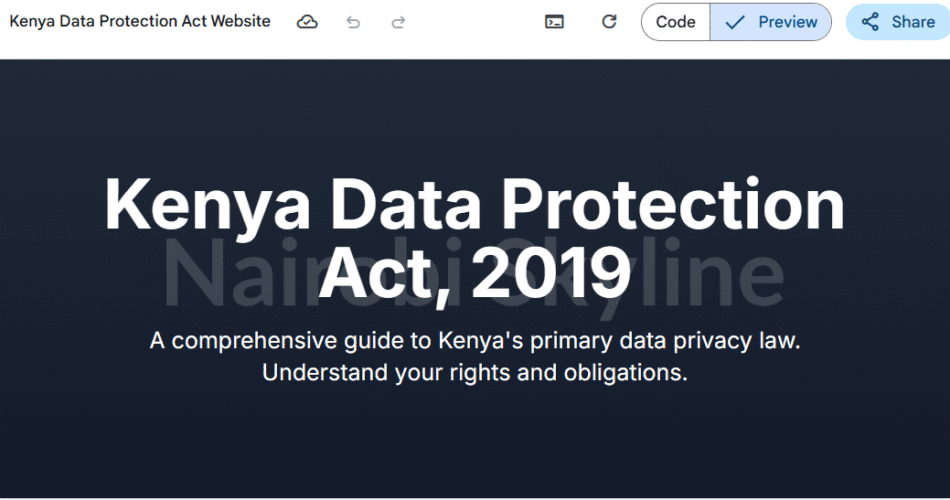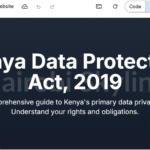Data Protection Act Kenya Compliance:
- Delivery Time2 Weeks
- English levelProfessional
- LocationUSA, United Kingdom, United Arab Emirates, New York, Nairobi, Kilimani, Kenya, Dubai, CBD Nairobi, Canada, Australia
Service Description
The cost of Data protection Act compliance in Kenya is 400000KES.Get Data protection Act in Kenya compliance at a price of 300000KES at Black Shepherd Technologies.
Navigate the Data Protection Act, 2019 in Kenya. This in-depth guide covers key principles, compliance requirements for organizations, the role of the Office of the Data Protection Commissioner (ODPC), registration processes, data subject rights, and the severe penalties for non-compliance. Learn how to protect personal data, implement a data protection policy, and ensure your business operates within the legal framework to avoid administrative fines and legal action. Essential reading for data controllers, processors, and anyone handling personal data in Kenya.
The enactment of the Data Protection Act, 2019 (DPA) in Kenya marked a pivotal moment for digital privacy and data governance in the country. Giving effect to Articles 31(c) and (d) of the Constitution of Kenya, which enshrine the right to privacy, the DPA establishes a robust legal framework to regulate the processing of personal data. This comprehensive legislation is designed to protect the privacy of individuals, referred to as “data subjects,” by placing strict obligations on all entities—public and private, natural and legal persons—that collect, store, or otherwise process personal data. Compliance with the DPA is not merely a legal formality but a fundamental requirement for any organization operating in or dealing with personal data of individuals in Kenya. The legislation is overseen by the Office of the Data Protection Commissioner (ODPC), which is mandated to enforce the Act, conduct investigations, and impose administrative fines and other penalties for non-compliance.
The cornerstone of the DPA is a set of seven core data protection principles that must guide all data processing activities. These principles are:
Lawfulness, fairness, and transparency: Personal data must be processed in a manner that is lawful, fair, and transparent to the data subject. This requires organizations to be open about their data handling practices and to have a legitimate reason for processing data.
Purpose limitation: Data must be collected for explicit, specified, and legitimate purposes and should not be processed in a manner incompatible with those purposes. Organizations cannot collect data for one reason and then use it for an unrelated one without obtaining new consent.
Data minimization: Only the minimum amount of personal data necessary for the specified purpose should be collected and processed. Organizations must avoid collecting superfluous information.
Accuracy: Personal data must be accurate and, where necessary, kept up to date. Reasonable steps must be taken to ensure that inaccurate data is erased or rectified without delay.
Storage limitation: Personal data should not be kept in a form which permits identification of data subjects for longer than is necessary for the purposes for which the data was collected. This necessitates the implementation of data retention policies.
Integrity and confidentiality: Organizations must implement appropriate technical and organizational measures to ensure the security and protection of personal data against unauthorized or unlawful processing, accidental loss, destruction, or damage.
Accountability: The data controller is responsible for demonstrating compliance with the data protection principles. This principle underpins all other obligations, placing the burden of proof on the organization to show that it is adhering to the law.
Compliance with the DPA begins with understanding the roles of the key actors. A Data Controller is the entity that determines the purpose and means of processing personal data, while a Data Processor processes personal data on behalf of a controller. Most organizations act as both. The first and most critical step for compliance is mandatory registration with the ODPC. The registration requirements and fees vary depending on factors such as the organization’s size (number of employees), annual turnover or revenue, and whether it’s a public entity or a not-for-profit organization. Certain sectors, such as telecommunications, crime prevention, and direct marketing, have mandatory registration requirements regardless of their size. Registration is done electronically through the ODPC’s online portal and is valid for 24 months before requiring renewal. Failure to register is a serious offense that can result in significant penalties.
In addition to registration, organizations must take proactive steps to ensure their entire data lifecycle management is compliant. This includes:
Implementing a robust data protection policy: This policy should outline the organization’s procedures for handling personal data, including collection, use, storage, and disposal, in line with the DPA’s principles.
Obtaining explicit and informed consent: The Act mandates that consent must be “express, unequivocal, free, specific, and informed.” Organizations must be able to prove that a data subject has given consent for a specific purpose.
Respecting data subjects’ rights: The DPA grants several rights to individuals over their personal data. These include the right to be informed of the use of their data, the right to access their data, the right to object to processing, the right to rectification or erasure of false or misleading data, and the right to data portability. Organizations must have clear processes in place to respond to these requests in a timely manner.
Conducting Data Protection Impact Assessments (DPIAs): For high-risk processing activities, such as those involving sensitive personal data or large-scale processing, a DPIA is required to identify and mitigate risks to data subjects.
Appointing a Data Protection Officer (DPO): While not mandatory for all organizations, appointing a DPO is highly recommended, and for certain entities, it is a legal requirement. A DPO is responsible for overseeing compliance and acting as a point of contact for the ODPC and data subjects.
Securing data and managing breaches: Organizations must implement appropriate technical and organizational security measures to protect personal data. In the event of a data breach, there are strict notification requirements to the ODPC and affected data subjects.
Regulating cross-border data transfers: The Act restricts the transfer of personal data outside of Kenya unless adequate safeguards are in place, such as binding corporate rules, standard contractual clauses, or an adequate level of data protection in the receiving country.
The DPA provides for a wide range of penalties for non-compliance, which can be severe. Fines can be up to KES 5 million or 1% of the organization’s annual turnover, whichever is lower. The ODPC has already demonstrated its willingness to enforce the law by issuing hefty fines to companies for various breaches, including using personal images without consent and processing third-party data for debt recovery without proper authorization. In extreme cases, non-compliance can lead to imprisonment for individuals. The law also gives data subjects the right to seek compensation for damages suffered due to an infringement of their rights.
In conclusion, compliance with the Data Protection Act, 2019 is a continuous and multifaceted process that requires a fundamental shift in how organizations handle personal data. It is not a one-time task but an ongoing commitment to transparency, security, and respect for the privacy rights of individuals. Organizations must prioritize data protection by design and by default, embedding these principles into all their operations to build trust with their customers, employees, and partners, while also safeguarding themselves from the significant financial and reputational risks associated with non-compliance.








